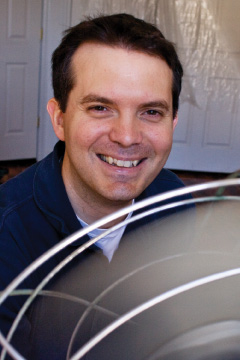 I can’t wait to get my next electricity bill. By following low-tech energy guru Nick Pine’s simple advice—monitoring the difference between indoor and outdoor temperatures—I’m certain that I’ve already reduced my A/C usage significantly. (Another tool in the battle to conserve: a rock-solid American-made fan from the 1950s that shows no signs of slowing down, though I should probably wear a weightlifting belt when I move it.)
I can’t wait to get my next electricity bill. By following low-tech energy guru Nick Pine’s simple advice—monitoring the difference between indoor and outdoor temperatures—I’m certain that I’ve already reduced my A/C usage significantly. (Another tool in the battle to conserve: a rock-solid American-made fan from the 1950s that shows no signs of slowing down, though I should probably wear a weightlifting belt when I move it.)
But the A/C is only one element of my energy diet. There are lots of places to nip and tuck. Someday we’ll all have access to a “smart grid,” something that tells us how much energy we use and how much it costs in real time. Local companies like Viridity Energy are already bringing the technology to forward-thinking institutions. An informed consumer is a more prudent consumer. When we finally modernize our electricity system, we will save money, reduce peak demand and make energy production more efficient.
Okay, I’m getting ahead of myself. (It tends to happen when I talk about this stuff.) I haven’t even mentioned that this is the Energy Issue—the one I’ve been looking forward to, oh, pretty much since the last one. When it comes to sustainability, it all boils down to energy.
Energy would make the perfect villain in a conspiracy theory, or answer to a riddle. It can take many forms—a liquid, a steam, a gas. Even though it’s everywhere, it’s shifty. “Honest officer, I put it in my tank a few miles back, but now it’s gone!” In every product we buy, from sneakers to cell phones, it’s embedded but unseen. We summon it easily, flicking switches and turning keys, but despite its ubiquity, it remains abstract.
Until we have to pay for it in our homes. Then it becomes real. In January 2011, when the PECO rate caps expire, our electricity bills will go up, and energy prices will start to feel very real for everybody in Philadelphia.
In our cover story, Samantha Wittchen explains the history of “the caps,” how they artificially kept our energy prices low and discouraged the growth of an alternative energy market, and why they are now “coming off.” This is really bad news, especially for the many families in Philadelphia already feeling the crunch of a bad economy. But, hopefully, with greater value placed on energy, we’ll become more aggressive about conservation and efficient production. We have a city full of leaky buildings, oozing energy that could be saved—this is an opportunity. Best case scenario: Our new energy reality will result in green job growth and a lower carbon footprint for the city.
To that end, I wholeheartedly encourage you to take full advantage of the programs and incentives being offered right now, listed on page 22. It’s up to us to lead the way and jump start the market for energy efficiency services.
On August 28, Grid will sponsor an event at Greenable in Northern Liberties with home auditor Rob Post (see page 25). He’ll demonstrate some easy, energy-saving, do-it-yourself projects. The cost is $10. Call to reserve a space or register on line. We have less than six months to prepare for this. Let’s get to work!
 Alex Mulcahy, Publisher
Alex Mulcahy, Publisher
alex@gridphilly.com


